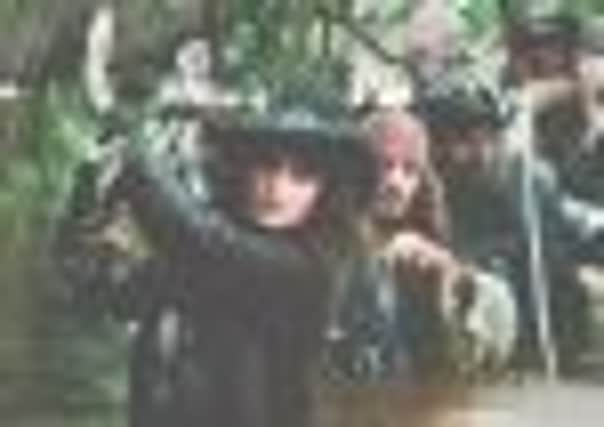Movie sequels ruled the roost in 2011, and this year is shaping up for a repeat performance


As 2011 comes to a close, the year turns out to have been a remarkable exercise in cinematic repetition. So far the top seven pictures at the US box office – which foreshadows what runs big in the UK – have been sequels, an alignment that appears unmatched in film history.
In terms of ticket sales the most popular seven films to date have been Harry Potter and the Deathly Hallows: Part 2; Transformers: Dark of the Moon; Twilight Saga: Breaking Dawn — Part 1; The Hangover Part II; Pirates of the Caribbean: On Stranger Tides; Fast Five; and Cars 2.
Advertisement
Hide AdAdvertisement
Hide AdThe strong opening for Mission: Impossible — Ghost Protocol suggests that it may well join a list that also includes Rise of the Planet of the Apes, from yet another film series, in the ninth position. If Sherlock Holmes: A Game of Shadows or Alvin and the Chipmunks: Chipwrecked follow the pattern, the year’s entire Top 10 may turn out to have been sequels.
Studio executives fed the trend that has been building for a decade. At least ten of about 30 major studio films released in the spring-summer blockbuster season were sequels or remakes, and another three — Thor, Green Lantern, and Captain America: The First Avenger — were based on comics whose kinship with existing films allowed them to play like parts of a “franchise”.
In 2012, much like last year, the major studios will offer about ten sequels or “reboots” – in which a familiar series starts again, from the top – featuring the return of proven draws like Spider-Man and the Bourne spy cycle, this time with Jeremy Renner as a new hero.
There will also be some startlingly fresh propositions on display but only a handful. One is Abraham Lincoln: Vampire Hunter from Fox — the title says it all. Fox will also put forth Prometheus, directed by Ridley Scott, a science-fiction thriller that probes deep into the origins of man.
Some producers believe the trend has become an epidemic that is threatening original cinema. “We need to reinvent the business, the way television did in the 1980s,” said John Davis, a studio producer whose dozens of credits include Gulliver’s Travels, I, Robot and Predator. “There’s just not enough risk taking.”
In the 1980s the pay-television service HBO began to experiment with original series and eventually revolutionised television with fare like The Sopranos and Sex and the City.
But when Davis took a risk last year with Mr Popper’s Penguins, a family film with Jim Carrey and a cast of penguins, it fell flat in a marketplace that found viewers hurrying to the Cars and Pirates of the Caribbean sequels.
But if familiarity prevailed in 2011, the consumer was complicit: the more original studio films failed to draw really big crowds. The best-performing comedy, Bridesmaids, took in $169 million but fell far short of, say, Fast Five, which crossed the $200m mark. The Help, so far the top drama, stopped at less than $170m, and remained outside the Top 10. More inventive propositions – Super 8, Cowboys & Aliens, Crazy, Stupid, Love, Moneyball, Real Steel, Contagion – some critically acclaimed, some not, never got close to the first rank.
Advertisement
Hide AdAdvertisement
Hide Ad“In an unsettling world people may gravitate toward the familiar,” said Martin Kaplan, the Norman Lear professor of entertainment, media and society at the Annenberg School for Communication. “There may be pleasure to be found in something new and different, but there’s also the risk of being disoriented or disappointed. Sequels are a kind of comfort food.”
Still, Hollywood is uneasy with a repetitiveness that must exhaust itself — there could be no Avatar 2 without Avatar — and is deeply unsatisfying to many of the bright people who still make studio movies.
In addition to profits they strive for the kind of inventiveness that was commonplace back in the early 1990s. In 1993, for instance, all ten of the top performers, including Jurassic Park, Mrs Doubtfire and The Fugitive, were freshly conceived, based on an original script, like Sleepless in Seattle, or adapted from another medium, like The Firm.
In May, as the popcorn season gets going, the audience will again begin to vote with its collective wallet on the more inventive films that will accompany high-octane sequels such as Men in Black 3, The Amazing Spider-Man, The Bourne Legacy, and The Dark Knight Rises.
Besides Abraham Lincoln: Vampire Hunter and Prometheus, the offerings include Premium Rush, from Columbia Pictures, an action film about, of all things, bicycle messengers; and The Dictator, from Paramount, a new outrage from Sacha Baron Cohen, who delivered shock and awe five years ago with his Borat frolic. If viewers are curious enough to take a look, it could be a fresh start for a future round of sequels.